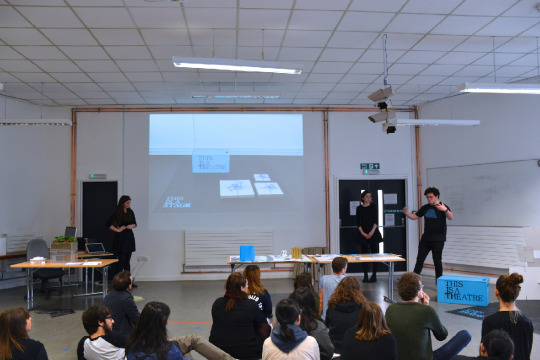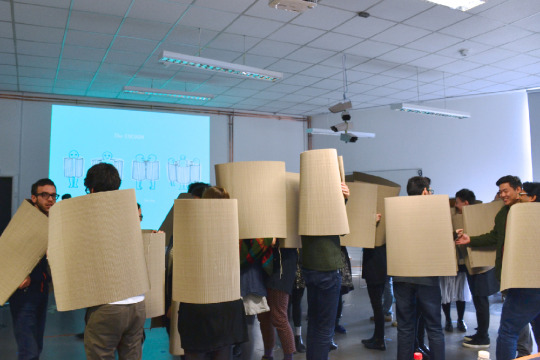Don't wanna be here? Send us removal request.
Photo

‘Mutagen' is coming!
Next week Goldsmith's MA Interaction Design degree show will take place at St. James Hatcham Church, New Cross, SE14 6AD.
Opening Night: Thursday December 14 from 6pm.
Open to the public: Friday December 15 & Saturday December 16 10 am-6pm
All are welcome!
1 note
·
View note
Video
vimeo
The Goldsmiths Design Festival will take place between 15 - 18 September 2016 at the St James Hatcham gallery in New Cross. MA ID student Erica Jewell will present ‘Kingdom of Weeds’ alongside work from students of other MA Design programmes.
Learn more about Kingdom of Weeds at:
http://kingdomofweeds.com/
View the festival programme at:
http://golddesignfest.co.uk/postgraduate-show/
MA-ID-03
1 note
·
View note
Photo

Julie L.Parisi was invited to speak at the panel discussion "Tableau talks" hosted by Oslo Runway and Tableau papers in Oslo, Norway on the 23rd of August 2016.
The talk involved a discussion about the importance of collaboration between policy makers, big brands and the underground fashion scene to create growth in a small industry, which Innovation Norway is suggesting could be one of the industries Norway can live off of after oil, as a "Post oil industry". More about the event and participants: http://oslorunway.andedit.no/2016/07/11/tableau-talks/
Link to video (In Norwegian without subtitles) https://vimeo.com/182358728
MA-ID-03
1 note
·
View note
Photo



Minji Kim and Jeehee Pak participated in the “What Design Can Do Refugee Challenge”, submitting a prototype for an interactive table that brings together locals and refugees and allows them to share food and stories as the table translates for them.
https://refugeechallenge.unhcrideas.org/Page/ViewIdea?ideaid=6998#.V9ezdUvR8s0.messenger
MA-ID-03
0 notes
Photo

Our show is coming! We are excited to announce our exhibition will be taking place in St. James Hatcham Church, New Cross, SE14 6AD. Opening night will take place on Dec 1st from 6pm. The show will remain open on Dec 2nd, 3rd and 4th between 10am and 6pm. We look forward to seeing you there!
0 notes
Photo




RESEARCHING AND DESIGNING IN THE FIELD
Have you been wondering about the placements that we undertook during the summer? Earlier this semester we did presentations on our experiences.
The organisations we worked with were very varied, from well known design and research studios to individual designers and emergent startups. The selection also included charity organisations and academia, including Goldsmiths University itself.
See some pictures of the presentations here
0 notes
Photo










Here are some of the posters that were made for the Goldsmiths Design Festival. We were asked to produce a ‘diagram’ which visualises a specific area or topic of interest which will directly inform our final graduate project.
2 notes
·
View notes
Photo


Yesterday we were busy mounting our posters for Goldsmiths Design Festival. The 16 posters introduce each of our Independent Research Projects which we will complete over the next 3 months. The festival opens at 6pm on campus tonight and we would love to see you there! You can see a full programme of festival events here: http://golddesignfest.co.uk
0 notes
Photo


During our Researching and Designing in the Field module we played host to many exciting guests. Thomas Thwaites enthralled us with tales of homemade toasters and efforts to become a goat. PLOT got us excited about their start-up incubator, while Thought Collider exposed us to their fascinating projects that sit at the intersection of biology and design. Other guests included Superflux, George Oates, Goldsmiths PhD candidate Alison Thomson and Bill Gaver and Sarah Pennington of the Interaction Research studio.
0 notes
Photo






Engaging Design Presentation
Our final presentations of the design research and outcomes of the Engaging Design module were performative, interactive and engaged various prototypes. The Theatres Trust group presented in lyrical manner a guerrilla style pop up theatre tool box, the Passenger Focus group wrapped us into cocoons to illustrate and raise awareness of personal space in public transportation, Innovate UK showed outcomes of their engaging event: tools to communicate with extra terrestrials, the Advisory Committee on Novel Foods and Processes presented examples of ecosystems for the home setting for GM farming, Visit Britain showed, through extensive prototyping, three different approaches to change queuing behaviour and the ICO group taught us tai-chi moves to engage with the surveillance technology of behaviour tracking.
4 notes
·
View notes
Photo



The first term of 2015 saw us working hard in our Engaging Design module. Our brief was to identify and research a group of people aligned with a particular public body. The class separated into seven groups. Between us we engaged with the following public bodies: Information Commissioners Office, The Theatres Trust, Advisory Committee on Novel Foods and Processes, Passenger Focus, Visit Britain, Innovate UK and the Environment Agency. Here you can see a glimpse of presentations from the early stages of the design process: researching in the field.
1 note
·
View note
Photo




For the first module of our course we were asked to design a nudge for a behaviour of our choice. We designed various nudges for different behaviour change, such as electro-mechanical active polymers for better performance of body language during public speech, shoes with transparent soles and velcro tights for promoting correct posture, an asian father device for western people to integrate in a multicultural environment, restrictive gloves to control shopping behaviour and a 5 Minute Holiday app to create a window of relaxation in the working day.
2 notes
·
View notes
Photo




The first class of Goldsmiths MA-ID have graduated!
Congratulations to all 11 graduates and programme leaders Alex Wilkie and Tobie Kerridge. We enjoyed celebrating with them last Wednesday and are excited to see the great things they will get up to in the near future.
4 notes
·
View notes
Photo





Algo News by Anuradha Reddy
Algo News is a by-product of explorations into news, language and algorithms.
We constantly rely on machines to make accurate decisions for us, whether we are buying plane tickets online, trading stocks or ordering Chinese take away. Our expectation for machines to behave in a certain way has left us quickly dismissing any slight inaccuracy as a malfunction or ‘bad data.’
Algo News subverts this notion by putting the machine through various stages of malfunction. The computer is programmed to source news content from different media channels with an algorithm that repeatedly generates alternate versions of each news item. The new content is published back out into mass media via Twitter, Youtube and a newspaper. Through these misrepresentations, Algo News opens up spaces for contemplation on different modes of machine-thought against a backdrop of our own expectations for machines.
1 note
·
View note
Photo



Methods for Supporting Sustainable Practices within Austin, Texas’ Chronically Homeless Community through Recycling and Additive Manufacturing by Eric Schneider
We are in an era of technological advancement — portable virtual reality, intelligent shopping carts, and wearable computers. But what does the future hold for how we interact with technology as humans? How can we take this technology and use it to help others outside our own community?
32 million tons of plastic waste is generated each year. Imagine the implications this has on poorer communities. As Eric Moen, International Outreach Coordinator at St. Martin’s Episcopal Church, suggests, “in Honduras, trash is everywhere…if you want to be done with something, you just throw it away.” This plastic can be recycled into a source of income — filament to feed sustainable 3D printers.
This research looks at one possible solution, among many, in creating sustainable ecosystems within poverty stricken communities. A technology like 3D printing can create opportunities for impoverished people, from the chronically homeless of Austin to remote villagers in Honduras.
0 notes
Photo



Hello Lesbian by Cameron Poole
Hello Lesbian is a design research project about a group of gay women from across the UK and their online dating experiences. I’ve engaged with these women and their unique identities to find strange, unfamiliar, and nuanced spaces for the design of new dating technologies. I’ve involved participants in a variety of qualitative methods to draw out their stories, insights, and ideas about meeting people online. Their intricate responses are found across the table and wall in the form of “live” research. The spaces for design that these women have opened up challenge the normative forms of interaction on existing dating technologies.
The resulting design implications reveal the messy texture of people’s lives for dating experiences that are less focused on compatibility and efficiency and more focused on expressive and embodied possibilities for constructing a sense of self and getting to know others online.
0 notes
Photo


Harry Taylor _V_ a:click Corp. by Kalliopi Vouzounara
This project explores the implications of Brain Computer Interface technology transitioning from complex scientific research to mundane technology via evidence of a fictional employment lawsuit. A brain computer interface is a direct communication pathway between the brain and an external device. This technology is applied to brain research and medicine, with the aim to assist people suffering from mobility, vision and hearing problems.
Recently, this technology has gone mainstream with various companies like NeuroSky, Sony, Emotiv, Mattel, and Interaxon applying it to gaming and self-brain monitoring to improve mental activities like meditation, relaxation and concentration. But, what is the meaning and value of brainwave data? What happens when this technology becomes rapidly commercialised, entering everyday life?
0 notes